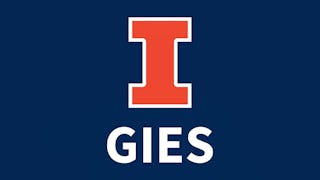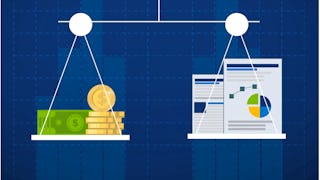Through this course, you will start by addressing the two “big questions” of accounting: “What do I have?” and “How did I do over time?” You will see how the two key financial statements – the balance sheet and the income statement - are designed to answer these questions and then move on to consider how individual transactions aggregate to make up these financial statements. After developing a broad understanding of accounting and financial statements, you will begin to develop a more nuanced understanding of individual components of doing business, such as making a sale or building inventory. By considering many of the more common actions of a company, you will build your understanding of accounting, and explore these concepts by applying them across various types of transactions. Once you understand these individual concepts better, you will be ready to return to the overall financial statements and use them as informational tools, including building ratios.



(469 reviews)
What you'll learn
Prepare key financial statements, such as balance sheets and income statements.
Gain an understanding of the steps and purpose of each step in the accounting cycle.
Explain how accounting relates to economic reality.
Skills you'll gain
Details to know

Add to your LinkedIn profile
32 assignments
See how employees at top companies are mastering in-demand skills

There are 7 modules in this course
Every organized society needs information about its activities and accomplishments. Accounting was created to fulfill this need. In this module we will explore how accounting was designed to meet the needs of decision makers and what this means to you as a user of accounting information. We will discuss the concept behind accrual accounting including introducing the two primary accrual accounting financial statements - the balance sheet and income statement. This module will discuss the purpose and goal of those financial statements, but we will save your experience in creating those statements until module two. In lesson two of this module, we will explore some basic bookkeeping tools that will get you ready to create a set of financial statements. The material in this module is likely to take less than a week, but we will make up for it in module two.
What's included
10 videos8 readings4 assignments1 discussion prompt
In this module we will create a set of accrual accounting financial statements. We will use that experience to walk you through the accounting cycle - which is the process by which accounting captures and aggregates all of the transactions in the period into a set of financial statements. We will examine each step in the accounting cycle using a comprehensive example of a start up wholesale book retailer. You will learn how the steps combine to create the statements. In addition to the comprehensive example we will do together, there will be plenty of chances to practice each step yourself. This module ends with a chance for you to build your own set of financial statements for a start up company. Fair warning: in my opinion this is the least exciting material covered in any accounting class (including this one). It is the basic bookkeeping process, not the interesting part of building an understanding of the business. But just as you need to learn basic addition and subtraction before you can master the math to design a beautiful building, you also need to learn basic bookkeeping as a foundation for the more interesting accounting.
What's included
7 videos6 readings5 assignments1 discussion prompt
In the last module we took an overview perspective to get a sense of the structure of financial statements. For the next three modules we are going to delve into the details of specific items on the accrual financial statements. We will work through the most common items on the balance sheet and income statement to develop an understanding of those items. While we will consider specific items, we will also be building a thought process that we can apply to any future accounting items - even if they are topics that we do not cover in this course. That will allow you to confidently use accounting for years to come, regardless of changes in items or in the specific accounting rules. There are two lessons in this module. The first will cover revenue and the related balance sheet item of accounts receivable. The second lesson will cover costs of goods sold and inventory. We will cover the conceptual economics of each, discuss the current accounting rules and end with a video that applies our bookkeeping tools. The readings for each lesson provide more details.
What's included
7 videos2 readings4 assignments2 discussion prompts
As firms operate, they often use long-lived assets to execute their business models. Some of these assets are tangible, such as factories or computers. Others are intangible, such as trademarks and brands. In either case, managers face the issue of determining how much of these items were used in each period as well as the related question of how much remains. In this module, we will examine the economics of such transactions as well how accountants reflect them on financial statements. This module will also cover the most nebulous of intangible assets - goodwill.
What's included
10 videos5 readings6 assignments4 discussion prompts
In the last two modules we have been exploring assets and their impact on both the balance sheet and income statement. In this module we will turn to discussing the other two components of the balance sheet: liabilities and owners equity.As firms operate, they make promise to deliver value to other entities. Accountants call these promises liabilities. You have already seen some liabilities as we discussed assets - after all, you get many assets by promising to give up future value. We will review those liabilities here as well as introducing a few new ones. Firms also have owners. Those owners sometimes directly provide capital and other times let managers retain capital generated by firm operations. Combined, those two sources of capital represent owners equity. We will discuss interaction with owners and how they impact our firms economic situation. We will also discuss how the accounting statements reflect these interactions.
What's included
7 videos4 readings5 assignments1 discussion prompt
We have been spending our time developing the concepts of accrual accounting. We started with the big picture, learned how to use bookkeeping to construct accrual statements and then spent the last three modules deep diving into various accrual accounting topics that help to create a useful set of financial statements. Throughout that time we have focused on capturing economics, not just cash flow. Of course, many of you still want to know about cash (so do I - it is important). But I have put off the cash flow statement for two reasons. First, I wanted you to really give accrual accounting a chance. If we mix cash in from the beginning, most students seem to drift back to cash every time things get a little complicated. But we have demonstrated that often leads to misinformed choices. Second, the cash flow statement effectively requires you to "undo" accrual accounting. That means you have to know accrual accounting pretty well to do a cash flow statement. I am going to be honest (I have all along, after all). The cash flow statement is tough. It seems like it should be really straight forward. Parts of it are. But a few choices were made when the cash flow statement rules were set. The choices make sense (well, somewhat), but they also make cash flow statements hard. We will break it down into pieces to make it approachable, but it is my experience that people need to see this multiple times. Lucky for you, the videos can be watched as often as you want. In this module I will systematically walk you through how cash flow statements are constructed. We will start with a cash T account and build statements from there. Our goal is to build an understanding of what information you can take from a cash flow statement. We are going to spend an entire week just on the cash flow statement. At the end of that week, I will expect you can understand an overall statement, but I will not expect you to be able to build one from scratch. Finally, I want to point out that this module is an inflection point in the course. We started looking at the idea of financial statements and creating broad statements in modules one and two. In modules three through five we began to look at the financial statements one item at a time. With this module we are moving back to the overall statement level, which is the perspective we will also take next module (which will be our last).
What's included
7 videos3 readings4 assignments3 discussion prompts
We have covered a lot of ground. You now are familiar with financial statements and the underlying transactions that create them. Our goal is to help you use accounting to make decisions and you have surely gotten much better at that. Now we get the big payoff - we learn how to build ratios to provide insights regarding the decisions we are making (maybe even to help us decide what types of decisions we should consider). We have seen a few ratios as we went through the course, but in this module we are going to discuss how to go about making your own ratios related to whatever question you want to answer. I think you will be surprised to find how easy it is now that you understand accounting. In fact, it is so easy that it will be just a couple of short lessons. Along with those short lessons, the rest of the week can be used to prepare for and take the final comprehensive exam. It will go back over material from each module to assure that you can pull it all together.
What's included
8 videos6 readings4 assignments
Earn a career certificate
Add this credential to your LinkedIn profile, resume, or CV. Share it on social media and in your performance review.
Instructor

Offered by
Explore more from Finance
 Status: Free Trial
Status: Free Trial
Rice University
 Status: Free Trial
Status: Free Trial
University of Illinois Urbana-Champaign
 Status: Free Trial
Status: Free Trial
Technical University of Munich (TUM)
 Status: Free Trial
Status: Free Trial
Duke University
Why people choose Coursera for their career




Learner reviews
469 reviews
- 5 stars
83.58%
- 4 stars
11.72%
- 3 stars
2.13%
- 2 stars
0.85%
- 1 star
1.70%
Showing 3 of 469
Reviewed on Apr 21, 2022
Amazing teacher and teaching style this rcourse really helped me to enhance my skills and knowledge further .
Reviewed on Jun 6, 2020
Having a wonderful experience one of the great teacher Prof Greg Miller gained a lot of learning from. Very Supportive and helpful material in this course specially lectures form Prof Greg Miller
Reviewed on Nov 7, 2020
adding merchandising operations would have been great. Otherwise, it's a very informative course.
New to Finance? Start here.

Open new doors with Coursera Plus
Unlimited access to 10,000+ world-class courses, hands-on projects, and job-ready certificate programs - all included in your subscription
Advance your career with an online degree
Earn a degree from world-class universities - 100% online
Join over 3,400 global companies that choose Coursera for Business
Upskill your employees to excel in the digital economy
Frequently asked questions
You can do this course standalone or to qualify for the residential component of the Finance for Strategic Decision-Making Executive Education program.
The Finance for Strategic Decision-Making Executive Education program is a hybrid learning opportunity consisting of two digital courses in Accounting and Finance and a companion in-person experience working hands-on with the faculty and your classmates with data and real world problems to identify solutions and opportunities. With this new blended learning program, Michigan Ross is the 1st to combine the ease of access via digital learning with a unique, in-person direct application experience, all with the rigor expected from a globally top ranked business school. You will have to earn a verified certificate in the course to be eligible for the face-to-face program at the Ross School of Business. To learn more, visit http://michiganross.umich.edu/financestrategy.
The pricing of the verified certificate is different depending on whether the course is stand alone, as is the case with the Accounting course, or if the course is part of a Specialization, as is the Finance course. All specializations are offered on a monthly subscription model.
More questions
Financial aid available,


